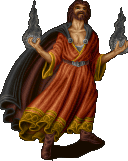Celts
The Celts are the nation of humans living on Gratogel. They came to Albion about 2000 years ago. They speak Celtic.
History
The earliest history of the Celts goes to around 3000 BC Earth, when they split off the Indo-Europeans. The Celts were people created by the Animebona, who had a deep connection to the world around them and their spirit allowed them to practice magic. Eventually, they came into conflict with their enemies, the people of Animenkna, whom they referred to as the Helromier.
The wars with the Helromier continued for many centuries. The greatest battle occurred around 50 BC, as part of Saethar's conquest of the lands of the Celts. He, alongside Broto, marched together and fought against two greatest leaders of the Celts, Vercingetorix and Catuvellaunus, and defeated them.
The Celts were wearied from the battles, but were never truly conquered. The missionary Bathrig took opportunity of their state, and preached the Unknown God to them, however he gave him a name, Iaghvir, and thus enticed the Celts into the name manifold of Animenkna.
Many Celts fell for the deception, but one of their leaders, Canto, recognized the lies. He had wandered the lands of Helromia and gained a lot of knowledge about their culture and philosophy. He gathered the last remaining faithful ones, and imagined a land beyond the mist where they could go and be free. Animebona opened a way through the Land of the Fog, and the Celts followed.
After they wandered for days, they finally reached their destined land, Albion. They entered Gratogel near a place where later they planted an oak tree, Qrenno. They also established a new school for the Druids there, Arjano.
The Celtic civilization has once again flourished on Albion for millennia, especially on Gratogel, where many of the tribes settled in villages and adopted a peaceful lifestyle. Others have ventured beyond the sea and colonized other continents, such as the Mahinos on Maini who became a separate nation.
Society
The Celts live in tribes which they call tuath. These tribes include the community of all clans and their families. Tribal kings are their local rulers and are seen as embodiment of the tribe. Their main task is to ensure harmony between the people an the land.
Druids are scholars of the Celts. They perform a variety of tasks, acting as priests, historians, teachers, healers and judges. Some of them have the gift of magic.
There are few true warriors among the Celts, as any man becomes a warrior in times of war, but most of them have another profession in times of peace. There are craftsmen such as potters, fabric weavers or basket weavers. The weapon smiths are special, as they all belong to the Umajo. Farmer, fisherman, trader and sailor are other common professions.
Owning cattle is a sign of wealth. People of high rank usually own cattle, which they can lease to their followers, called ceile. In return for payment and the lease of cattle, ceiles relinquish part of their legal rights and are obligated to yield their vote to their leader during meetings.
Beliefs
The Celts have many gods. The greatest are Lugh, the great god of business, travellers and trade, and Danu, the great Goddess and mother who is embodied by Albion itself. In addition, there are the gods of farmers, craftsmen, poets and warriors, as well as a number of minor gods honored by their district's inhabitants. Concerning life after death, the Celts believe they will live again in another wondrous land.
Arts
Colors and symbols are very important to the Celts. Symbols contain intricate lines, which appear symmetrical, but turn out not to be upon closer examination, and forms which can appear to be ornaments at one moment and depictions the next. The greatest works of art can lend magical powers to objects through their symbols.
Poets are held in high regard. They are even feared by powerful warriors, as the Celts are well aware how a well-aimed satirical verse can damage a reputation as much as an inglorious defeat.
Language
The Celts speak a language similar to the language of their forefathers from Earth, with many words, phrases, and names in their language that are comparable to the Proto-Celtic language or Old Irish.
Outside of Gratogel, the language has evolved into the language of the Mahinos.
List of phrases
- Togi Din
- "What a pleasant day it is."

